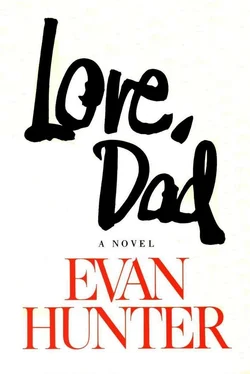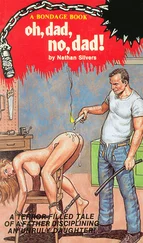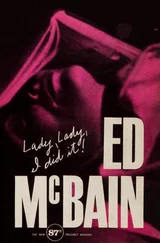She couldn’t possibly imagine what was so fascinating about her panties. Or anybody’s panties, for that matter. Walk down the main street, you could see as many panties as you cared to in any of the lingerie shops. But here were grown men, some of them ancient, in fact, craning for a look up her skirt, and it bothered her. Even some of her parents’ friends, whose own daughters wore minis, for Christ’s sake, would sometimes openly stare at her legs whenever she sat down, hoping for a glimpse of those cherished panties of hers. She was sometimes tempted to put on a mini with nothing at all under it, surprise hell out of them.
She laughed aloud, and when Warren asked her what was so funny, she said, “Nothing.”
“Is it me?” he asked. “Did I do something?”
“No, no,” she said, and wondered if Warren had changed more than his name, after all. “Nothing you did or said.”
“Well, good,” he said, sounding tremendously relieved.
He dropped off the package at his house, and then pedaled the bike a mile or so out of town, along a road crawling with automobiles, the men glancing covertly at her legs as they rode past, annoying her, damn it. She was relieved when she spotted the hotel ahead, a huge Victorian monster squatting in shingled bygone splendor on the ocean’s edge. Warren pedaled the bike past it and onto an access road that rapidly deteriorated into nothing more than a sandy lane. When he could pedal no further, Lissie climbed down onto the sand and immediately took off her sandals. Warren pushed the bike, with some difficulty, to a patch of swaying beach grass, laid it on its side, and then padlocked the front wheel to the crossbar. “They’re usually over this way,” he said, and began climbing the dune.
They had not, as Warren had indicated, requisitioned a corner of the private beach for themselves, but rather had set up an enclave just beyond the PRIVATE BEACH — HOTEL PATRONS ONLY sign. There were, Lissie estimated at first glance, close to forty kids sprawled there on the sand, or standing in tight little clusters, or sitting around a dark-haired girl who was wearing a minuscule bikini that threatened her huge breasts and earth-mother hips, strumming a guitar and singing the song Joan Baez had dedicated to her husband on a CBS show this past March, a ballad praising draft-resisters. Lissie had caught the show during her detention period, had heard the dedication to Baez’s husband, and the words, “He is going to prison for three years.” She later read in the New York Times that CBS had cut the rest of her speech: “The reason is that he resisted Selective Service and the draft and militarism in general.”
The kids, Lissie guessed, ranged in age from seventeen to twenty-two; one of the boys was wearing a Princeton sweatshirt; another had on a T-shirt almost certainly hand-lettered: the front of the shirt read FUCK VIETNAM! Warren seemed a little young for this crowd, but he did appear taller even now that he was off his bicycle, and at least three of the kids greeted him by name (Warren and not Pee Wee) as they approached. He introduced Lissie to the boy in the Princeton sweatshirt, whose name was Pete Turner, and who seemed to lose interest in her the moment he scanned the peasant blouse and the scant treasures it held, preferring instead to turn his gaze back to the folksinger’s more obvious charms. She finished the Baez tune, and then began singing Dylan’s “Like a Rolling Stone.” A quarter of the kids were listening to her, the rest were talking or clowning around in the sand, or tossing Frisbees. Along about noon, somebody suggested they all wander up to Sam’s — which was the name of the new place near the lighthouse — for lobster rolls. A dozen kids went, the rest of them stayed behind, drinking beer.
At three in the afternoon, the kid with the FUCK VIETNAM! T-shirt broke out some pot, and some of the other kids followed suit, and they all sat smoking openly on the beach, even though they could see Massachusetts State Police cars cruising the road above. Lissie hadn’t smoked since her graduation; it was almost impossible to find anything either in Rutledge or in Talmadge, and Rusty Klein, who had begun smoking shortly after the Christmas vacation, said that buying grass from the greasers in Clayton was dangerous. Sitting beside Warren, sharing a joint with him, she felt at peace with herself for the first time in a long time. When he asked if she’d like to go to a cookout with him that Sunday night, the twentieth, she said yes.
The woman was about Connie’s age, a redheaded American wearing a Pucci bikini she’d bought in the hotel boutique the day before at a scandalously low price, or so she claimed, because the new line was coming in any day now and the shop was eager to clear its shelves. The woman made her home in Florence, so Jamie figured she qualified as a Pucci comparison shopper. Her name was Lynda, with a y, and she’d been running an art gallery on the Arno for the last fifteen years. She was from Philadelphia originally; Jamie suspected there was old money in her family. Her cadences were oddly European; she spoke her native English without a trace of accent, and yet her intonation was peculiarly foreign. She had lowered the straps of the bra top and was spreading suntan lotion on the sloping tops of her breasts. She smelled of coconut.
The man’s name was Ernesto. He was from Argentina, the owner of a cattle ranch down there, and he visited Italy only sporadically though he claimed to be married to Lynda. He spoke Italian fluently, however, and he told Jamie that the proper way to summon a waiter in Italian was to say “senta” which meant “listen,” and not “cameriere,” which meant “waiter,” a word seldom used by sophisticated Italians, and a word he was sure Jamie, as an American, found enormously difficult to pronounce. Jamie felt that summoning a waiter with the word “listen” was tantamount to snapping your fingers at him. But he watched as Ernesto called to the waiter, the word issuing softly from his lips, “senta,” watched as the waiter turned immediately and scurried to where they were sitting by the pool. Ernesto ordered another round of Costa Smeraldas, warning that for all its minty, confectionary taste, the drink could hit you very hard here in the strong Sardinian sun. Lynda lay face down on the lounge and untied the straps of the bra top.
Ernesto’s Spanish and Italian were better than his English, but Lynda willingly served as prone translator. Ernesto wanted to know how much you tipped a cabdriver in New York City, and whether or not prostitution was as open there as it was in Hamburg. Lynda was eager to hear all the latest slang, she’d been away from America for such a long time. Did people still say something was a “drag”? Jamie told her the expression was now “a bummer” (“Come?” Ernesto asked. “Bomber?”), which he guessed had filtered into the vernacular from the jargon of drug-users, a “bum trip” signifying a bad experience with LSD. Ernesto asked if the use of drugs was as widespread in America as all the magazines seemed to claim, and Connie said she guessed maybe 10 percent of the kids smoked marijuana, certainly no more than that. Lynda said she’d read in the overseas edition of Time that something like eight million Americans had at least sampled marijuana, and Connie said, “Oh, no, nothing nearly like that,” and then said, “Am I the only one who’s suffocating?” and headed for the pool. Ernesto followed her.
“Was it difficult to become a photographer?” Lynda asked.
“Yes,” he said.
“Because I have a nephew back home who’s considering it. How did you start?”
“Well, you don’t really want to hear that, do you?”
Читать дальше












